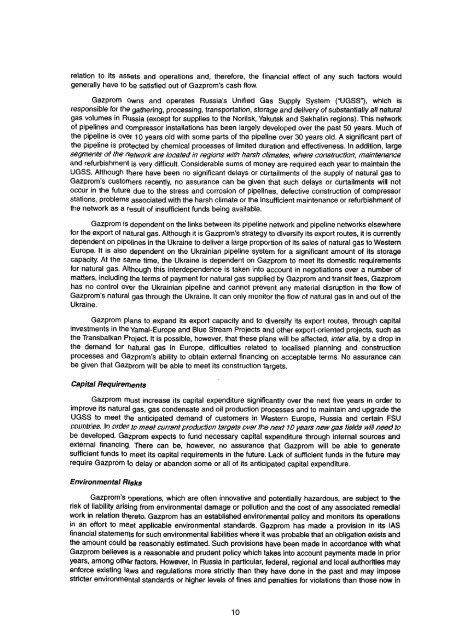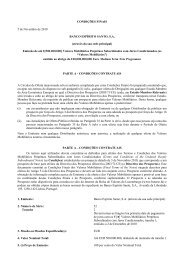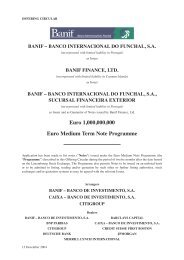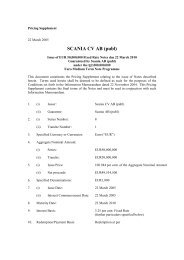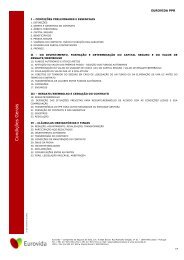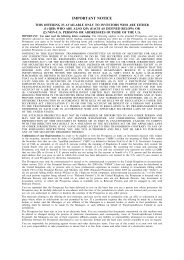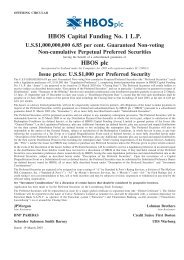Open Joint Stock Company Gazprom
Open Joint Stock Company Gazprom
Open Joint Stock Company Gazprom
Create successful ePaper yourself
Turn your PDF publications into a flip-book with our unique Google optimized e-Paper software.
elation to its assets and operations and, therefore, the financial effect of any such factors wouldgenerally have to be satisfied out of <strong>Gazprom</strong>'s cash flow.<strong>Gazprom</strong> owns and operates Russia's Unified Gas Supply System ("UGSS"), which isresponsible for the gathering, processing, transportation, storage and delivery of substantially all naturalgas volumes in Russia (except for supplies to the Norilsk, Yakutsk and Sakhalin regions). This networkof pipelines and compressor installations has been largely developed over the past 50 years. Much ofthe pipeline is over 10 years old with some parts of the pipeline over 30 years old. A significant part ofthe pipeline is protected by chemical processes of limited duration and effectiveness. In addition, largesegments of the network are located in regions with harsh climates, where construction, maintenanceand refurbishment is very difficult. Considerable sums of money are required each year to maintain theUGSS. Although there have been no significant delays or curtailments of the supply of natural gas to<strong>Gazprom</strong>'s customers recently, no assurance can be given that such delays or curtailments will notoccur in the future due to the stress and corrosion of pipelines, defective construction of compressorstations, problems associated with the harsh climate or the insufficient maintenance or refurbishment ofthe network as a result of insufficient funds being available.<strong>Gazprom</strong> is dependent on the links between its pipeline network and pipeline networks elsewherefor the export of natural gas. Although it is <strong>Gazprom</strong>'s strategy to diversify its export routes, it is currentlydependent on pipelines in the Ukraine to deliver a large proportion of its sales of natural gas to WesternEurope. It is also dependent on the Ukrainian pipeline system for a significant amount of its storagecapacity. At the same time, the Ukraine is dependent on <strong>Gazprom</strong> to meet its domestic requirementsfor natural gas. Although this interdependence is taken into account in negotiations over a number ofmatters, including the terms of payment for natural gas supplied by <strong>Gazprom</strong> and transit fees, <strong>Gazprom</strong>has no control over the Ukrainian pipeline and cannot prevent any material disruption in the flow of<strong>Gazprom</strong>'s natural gas through the Ukraine. It can only monitor the flow of natural gas in and out of theUkraine.<strong>Gazprom</strong> plans to expand its export capacity and to diversify its export routes, through capitalinvestments in the Yamal-Europe and Blue Stream Projects and other export-oriented projects, such asthe Transbalkan Project. It is possible, however, that these plans will be affected, inter alia, by a drop inthe demand for natural gas in Europe, difficulties related to localised planning and constructionprocesses and <strong>Gazprom</strong>'s ability to obtain external financing on acceptable terms. No assurance canbe given that <strong>Gazprom</strong> will be able to meet its construction targets.Capital Requirements<strong>Gazprom</strong> must increase its capital expenditure significantly over the next five years in order toimprove its natural gas, gas condensate and oil production processes and to maintain and upgrade theUGSS to meet the anticipated demand of customers in Western Europe, Russia and certain FSUcountries, in order to meet current production targets over the next 10 years new gas fields will need tobe developed. <strong>Gazprom</strong> expects to fund necessary capital expenditure through internal sources andexternal financing. There can be, however, no assurance that <strong>Gazprom</strong> will be able to generatesufficient funds to meet its capital requirements in the future. Lack of sufficient funds in the future mayrequire <strong>Gazprom</strong> to delay or abandon some or all of its anticipated capital expenditure.Environmental Risks<strong>Gazprom</strong>'s operations, which are often innovative and potentially hazardous, are subject to therisk of liability arising from environmental damage or pollution and the cost of any associated remedialwork in relation thereto. <strong>Gazprom</strong> has an established environmental policy and monitors its operationsin an effort to meet applicable environmental standards. <strong>Gazprom</strong> has made a provision in its IASfinancial statements for such environmental liabilities where it was probable that an obligation exists andthe amount could be reasonably estimated. Such provisions have been made in accordance with what<strong>Gazprom</strong> believes is a reasonable and prudent policy which takes into account payments made in prioryears, among other factors. However, in Russia in particular, federal, regional and local authorities mayenforce existing laws and regulations more strictly than they have done in the past and may imposestricter environmental standards or higher levels of fines and penalties for violations than those now in10


